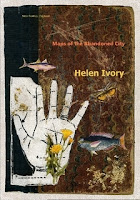Tuesday Poem: Helen Ivory - Nights in the Abandoned City
Dark comes home to the abandoned city
and heaves off its boots by the fire.
It is astonishing how weary the dark is from its work,
its commute through choking towns and encampments.
It talks to the flames of the things it has seen
of the stilled hearts it has held
between finger and thumb.
It unburdens itself of all human sorrow.
And the fire, pretending for now
it is a hearth at the centre of a church house,
listens like a priest and bites its own tongue,
imbues the parlour with cloying incense.
In the shadowplay, the dark is a plague doctor’s mask,
a bone-saw, a gathering of spat-out teeth.
Soon, fire will describe a still life of eyeglasses:
their tiny infinities – all their dashed lenses.
Copyright Helen Ivory, reproduced with permission,
Survision Books, 2019
Human beings have a strange fascination for abandoned habitations – lost Mayan cities, Aztec palaces, Egyptian cities made uninhabitable by drought, disease and changing political climates. In Italy, I used to spend hours exploring the ruined villages of the Alpi Apuane, abandoned during and after WW2. Some of the houses still contained rusting metal bedframes, chairs, cooking implements, rotting clothes. I felt like a ghost. Films of the abandoned towns of Chernobyl and Pripyat, death traps of nuclear radiation, are among the most watched items on YouTube. You can even book tours of the surreal landscape if you go to Russia or the Ukraine.
Is it because this is one of our greatest subliminal fears? The end of civilisation? That the structure that protects and shelters us could cease to function and revert to The Wild? Chernobyl and Pripyat are inhabited by bears and foxes and other animals in a flourishing of wildlife no longer threatened by humans. The lost Italian villages are being reclaimed by the forest, colonised by wild boar, ghiri and pine martens.
Helen Ivory’s surreal collection of poems taps into this fascination, using a kind of archaeology of the imagination. It articulates our worst fears about climate change, system collapse and the consequences of our negligent trashing of the natural world.
The sequence begins ‘In a Time Before Maps’:
‘Long ago when the city was an infant
it lay on its back on a big white sheet . . .
. . . the city grew vivid, grew hearty,
grew schools and grew graveyards
and when these were replete, it grew more.’
But then the city ‘simply vanished’ and the Cartographer steps out ‘from a fold in the sky’ and begins to trace what is there to discover. There are mirrors empty of images, empty rooms, empty streets.
‘The Street of the Graveyard is lined with books,
with symbols and scorings no one can decipher
and carvings of cherubs too weighty to fly.’
Clocks have ‘unhitched themselves’ from timetables and turned their faces to the sun. The ruins are littered with photograph albums of people no one can now recognise, crockery, upturned chairs, ‘the geography of landfill’. The animals have escaped from the zoo.
In The Birds, with the ‘rustling of a million feathers’, the birds work for six days and nights ‘to garner each cast-off wrapping, each scuttling drink can,/each motley fragment of plastic’. And, on the seventh day, they have erected ‘A nest, a glorious nest reaching out to the high heavens’.
At the end, the Cartographer unmakes what she has created. Blotting out the paths, the ‘tower block and castle’ with a white brush as though covering every known feature with snow.
‘And when there is no one left
to remember the City,
when all has turned to fireside yarns and myth,
a traveller will open out
some spotless pages of the map
and imagine lady fortune shines on him.’
Helen Ivory is also a visual artist and perhaps it is this way of looking and imaging that gives her poetry such a surreal quality. She unhitches your imagination from the ordinary and predictable, then takes it for a spin. Expect the unexpected! Helen has won an Eric Gregory Award and her fourth Bloodaxe Books collection, the semi-autobiographical Waiting for Bluebeard was short-listed for the East Anglian Book Awards (2014). She edits the webzine Ink Sweat and Tears and is tutor and Course Director for the UEA/National Centre for Writing online creative writing programme. She received an Arts Council of England Award to work on her fifth collection for Bloodaxe The Anatomical Venus, which centres on women and otherness. The Anatomical Venus will be published in May 2019.





Comments
Post a Comment